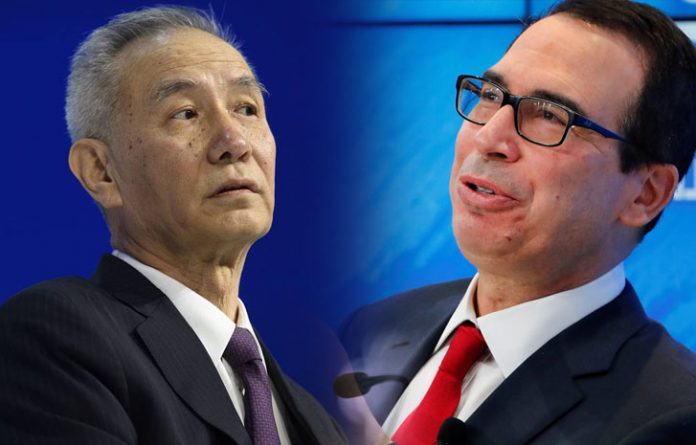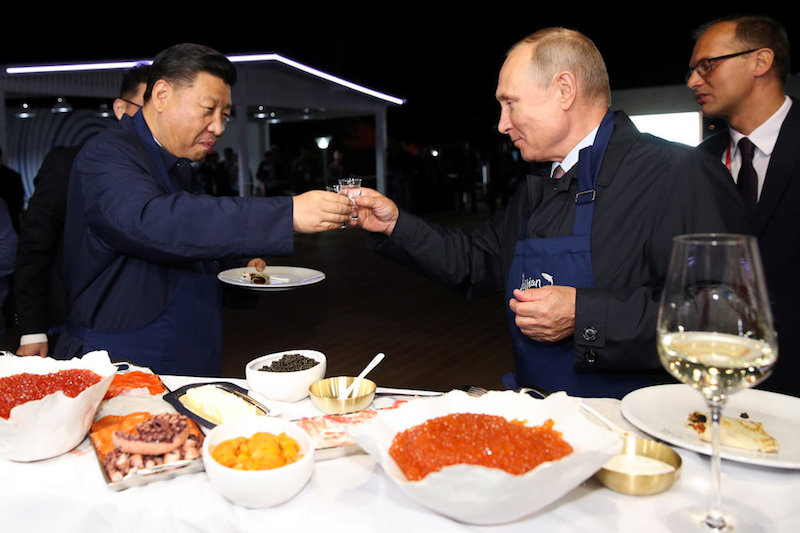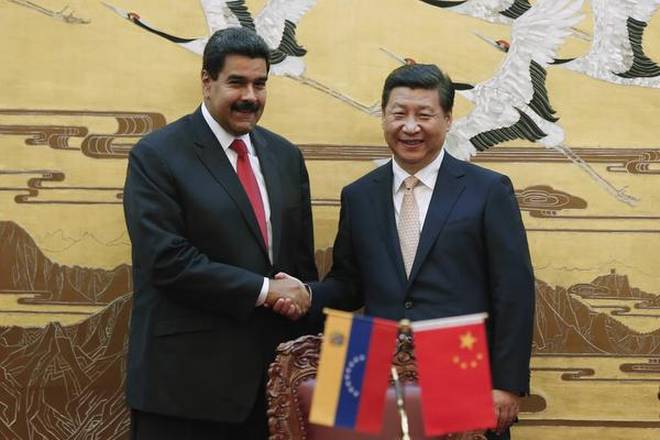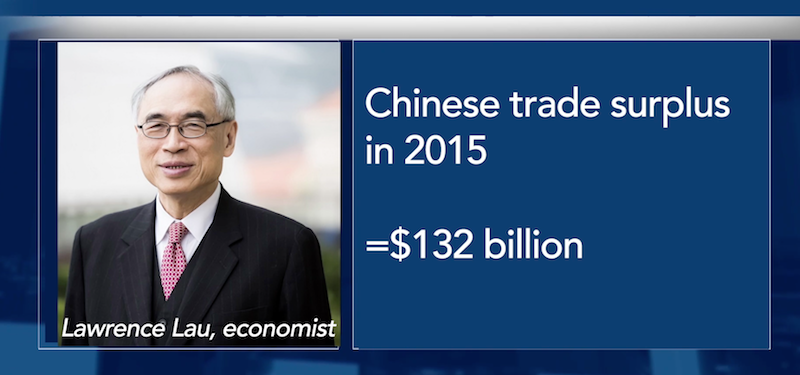
 China and the U.S. Discussing New Trade Talks, As Pressure Over Trade Policy Grows
China and the U.S. Discussing New Trade Talks, As Pressure Over Trade Policy GrowsChina and the U.S. are discussing plans for another round of trade talks, Chinese officials confirmed this week — just days after President Trump threatened a third round of tariffs which would mean duties would be applied to almost all Chinese goods entering the U.S. The invitation for talks was reportedly sent on behalf of Treasury Secretary Steven Mnuchin to Vice Premier Liu He. Despite indications that talks may not take place until after the U.S. midterms, U.S. officials said this week that communication between the two countries was improving. "Most of us believe it's better to talk than not to talk," Lawrence Kudlow of the White House National Economic Council said, according to The Wall Street Journal. "You could say that communication has picked up a notch."
These reports come at a time when more and more American businesses are speaking out to argue that the trade war is hurting U.S. industries at home and overseas. On Thursday, two American Chamber of Commerces in Beijing and Shanghai jointly released a new report measuring the impact of tariffs imposed by both governments since July. Many of the 430 American companies surveyed reported that the tariffs have increased manufacturing costs and decreased demand for their products. The Chairman of AmCham China, William Zarit, said that the White House's strategy of new tariffs worth $200 billion "risks underestimating China's capability to continue meeting fire with fire." In a potential indication of this, the U.S.-China Business Council said this week that Chinese officials told them that they were delaying decisions on license applications from American companies until the China-U.S. relationship improves.
In light of increasing domestic controversy over trade policy in the U.S., Trump administration officials will be under increasing pressure in the run up to the November midterms. Touching on this topic in an article on China-US Focus this week, Chen Yonglong of the China Foundation for International Studies argued: "The Chinese people are ready for dialogue and negotiation at any time, and to keep talking as long as the U.S. wants to. With China prepared for the long haul, talking for three to five years, even for eight to 10 years, can the constantly beleaguered President Trump afford such a long wait?"
 Is the U.S. Driving Russia and China Together?
Is the U.S. Driving Russia and China Together?Earlier this week, two events showcased the growing cooperation between Russia and China: the 2018 Eastern Economic Forum, and the Vostok war games. From Tuesday to Thursday, the Russian-sponsored Eastern Economic Forum gathered businesspeople and state leaders from over 60 countries to discuss cooperation under the theme of "The Far East: Expanding the Range of Possibilities." Presidents Putin and Xi met on the sidelines of the forum to discuss potential agreements regarding "Russian-Chinese regional, production and investment cooperation in the Far East." Presidents Xi and Putin released a joint statement Tuesday, saying that the two countries would promote "standing firm against unilateralism and protectionism to construct a new type of international relations and a community of shared future for mankind."
This one-on-one meeting coincided with the active participation of the Chinese military in the Russian-led Vostok games. Slated as the country's largest military exercise in nearly 40 years, China sent more 3,000 troops and 900 weapons to the games. The Chinese Ministry of Defense commented the goal of Chinese participation is to strengthen the strategic partnership between China and Russia.
Despite these two high profile events, a continuous, solidified alliance between the two countries is far from guaranteed. Former U.S. State Department official Anja Manuel notes in The Atlantic that the repeating pattern that underlines the relationship is: "historic distrust, much more hype than realism about their current partnership, but a gentle trend towards more cooperation." But as the China-U.S. trade war causes serious fractures in the foundation of that critical relationship, Moscow is eager is to make the U.S. loss a Russian gain. China-US Focus contributor Yu Sui argued last month that, in its haste to pressure China and court Russia, the Trump administration unwittingly contributed to a strengthened relationship between the two; a result it may come to regret.
 Venezuelan President Visits China in an Effort to Seize Economic Lifeline
Venezuelan President Visits China in an Effort to Seize Economic LifelineVenezuelan President Nicolas Maduro headed to China on Thursday for a four-day trip to boost relations with Beijing. This comes amid an economic meltdown caused by hyperinflation that is ravaging Venezuela and has triggered a refugee crisis. Maduro will look to quell the unprecedented humanitarian disaster, hoping this trip to Beijing will be the start of economic recovery. This week it was reported that Beijing has given Venezuela, one of the world's largest oil exporters, a $5 billion credit line through oil-for-loan agreements.
Maduro will attend an annual meeting of senior Chinese and Venezuelan officials, and is also expected to meet Chinese President Xi Jinping to oversee the signing of the deals and discuss bilateral ties. As Venezuela's largest source of foreign investment, China has maintained a stable relationship with Venezuela over the past few decades. Chinese Vice-President Wang Qishan told Venezuelan Vice-President Delcy Rodriguez in a meeting Wednesday that China "stood ready to work with Venezuela to safeguard the interests of developing countries."
Looking for economic support from Beijing, Maduro is expected to highlight the country's relationship with China and assure the Chinese government that the steps Venezuela is taking toward countering economic problems, including currency devaluation, restructuring of the state oil producer and raising the minimum wage, will be successful. Before he left Venezuela, Maduro said in a televised address that he holds great expectations for the trip. "We are leaving under better conditions, having activated a program of economic recovery, growth and prosperity. We are going to improve, broaden and deepen relations with this great world power," Maduro said.
 U.S. Trade Deficit with China in Statistics
U.S. Trade Deficit with China in StatisticsThe U.S. trade deficit with China in 2017 was estimated to be nearly $335 billion. But is that figure correct? The Wall Street Journal has reported that the deficit could actually be half that. Apple's iPhone is a prime example: its component parts come from a number of countries, but because it is assembled in China, the total manufacturing cost is wrapped up in its export value. This single product illustrates how the trade gap between China and the U.S. is likely smaller than is being reported. In our latest video, China-US Focus seeks to explain the trade deficit and the factors that affect it, including the U.S. national savings rate and foreign direct investment. Watch the full video here.
Prepared by China-US Focus editorial teams in Hong Kong and New York, this weekly newsletter offers you snap shots of latest trends and developments emerging from China every week, while adding a dose of historical perspective.
- 2018-09-07 Forum on China-Africa Cooperation Yields New Pledges
- 2018-08-31 BRI’s Fifth Anniversary Comes Amidst Debate Over Sustainability
- 2018-08-24 Trade Talks Continue in DC as New Tariffs Hit
- 2018-08-17 Trade Talks Back On
- 2018-08-10 American Natural Gas Industry Braces for New Chinese Tariffs
- 2018-08-03 Tentative Signs of U.S.-China Cooperation at the ASEAN Summit
- 2018-07-27 President Trump’s Trade War Bailout
- 2018-07-20 Xi Charms the World
- 2018-07-13 China Defends WTO Record in the Face of Additional U.S. Tariffs
- 2018-07-06 The Trade War Begins
- 2018-06-29 President Trump Chooses Slightly Softer Option on Chinese Investment
- 2018-06-22 Trade Tensions Spark Stock Sell-Off in China
- 2018-06-14 How “Comprehensive” Is the Kim-Trump Agreement?
- 2018-06-08 China Awards Putin First Medal of Friendship
- 2018-06-01 USPACOM Rebranded As U.S. Indo-Pacific Command
- 2018-05-25 Trump Cancels North Korea Meeting
- 2018-05-18 The On/Off Trump-Kim Summit
- 2018-05-11 American Goods Are Stuck at Chinese Ports
- 2018-05-04 China and the U.S. Lay Trade Demands on the Table
- 2018-04-27 U.S. Delegation Will Visit China Next Week
